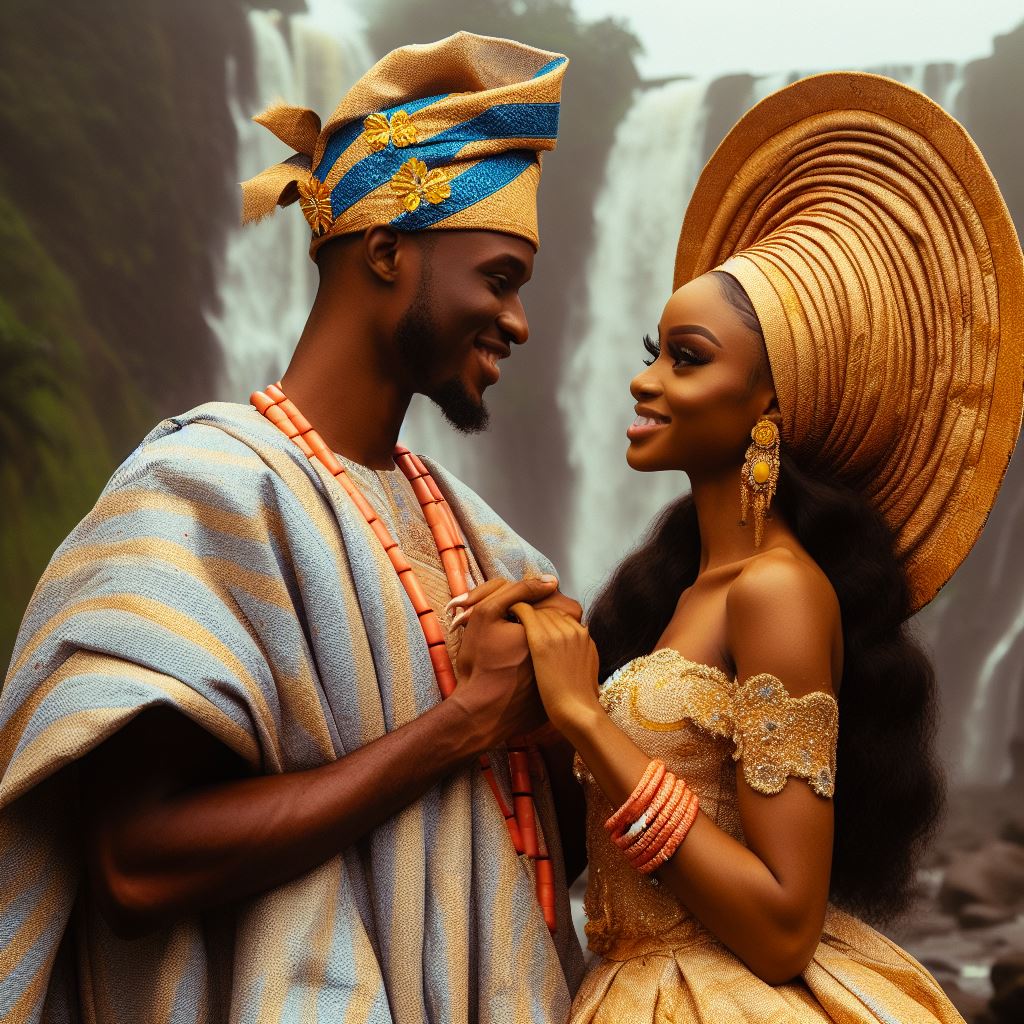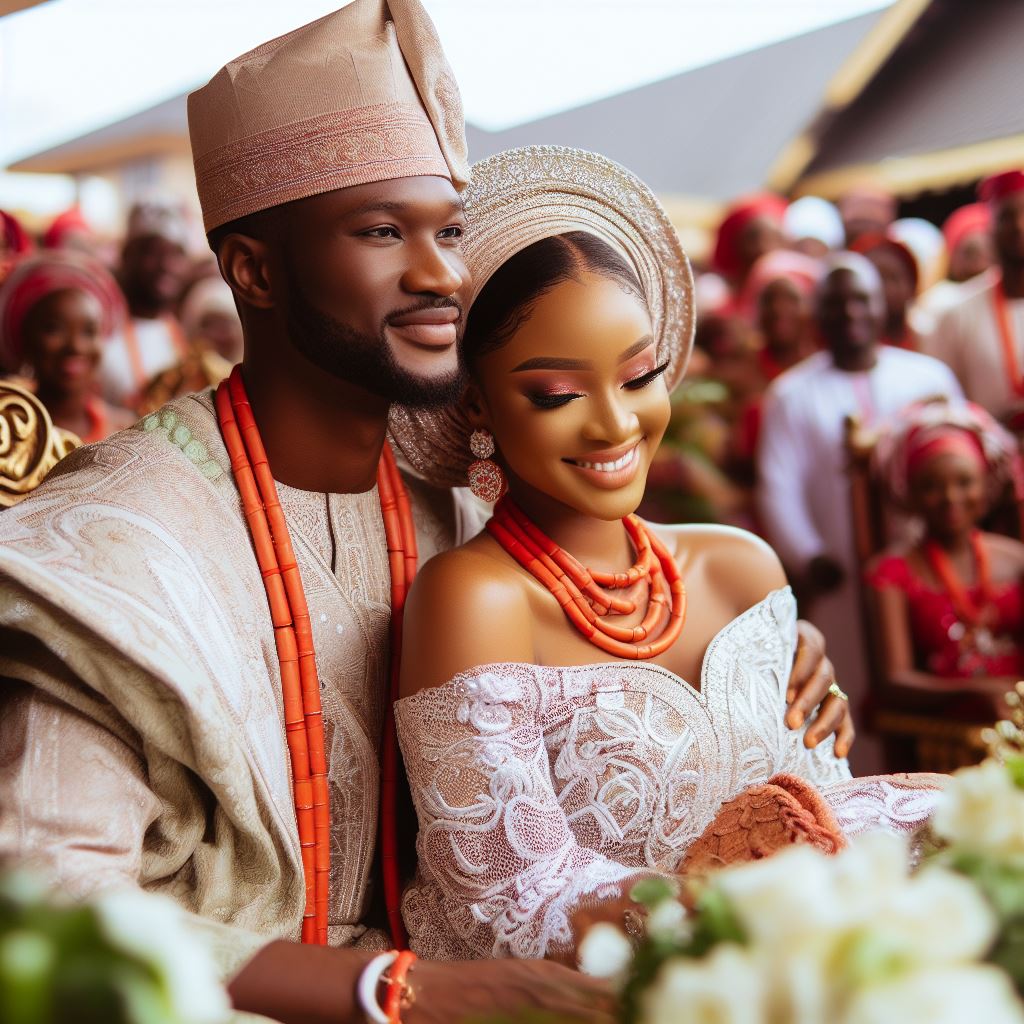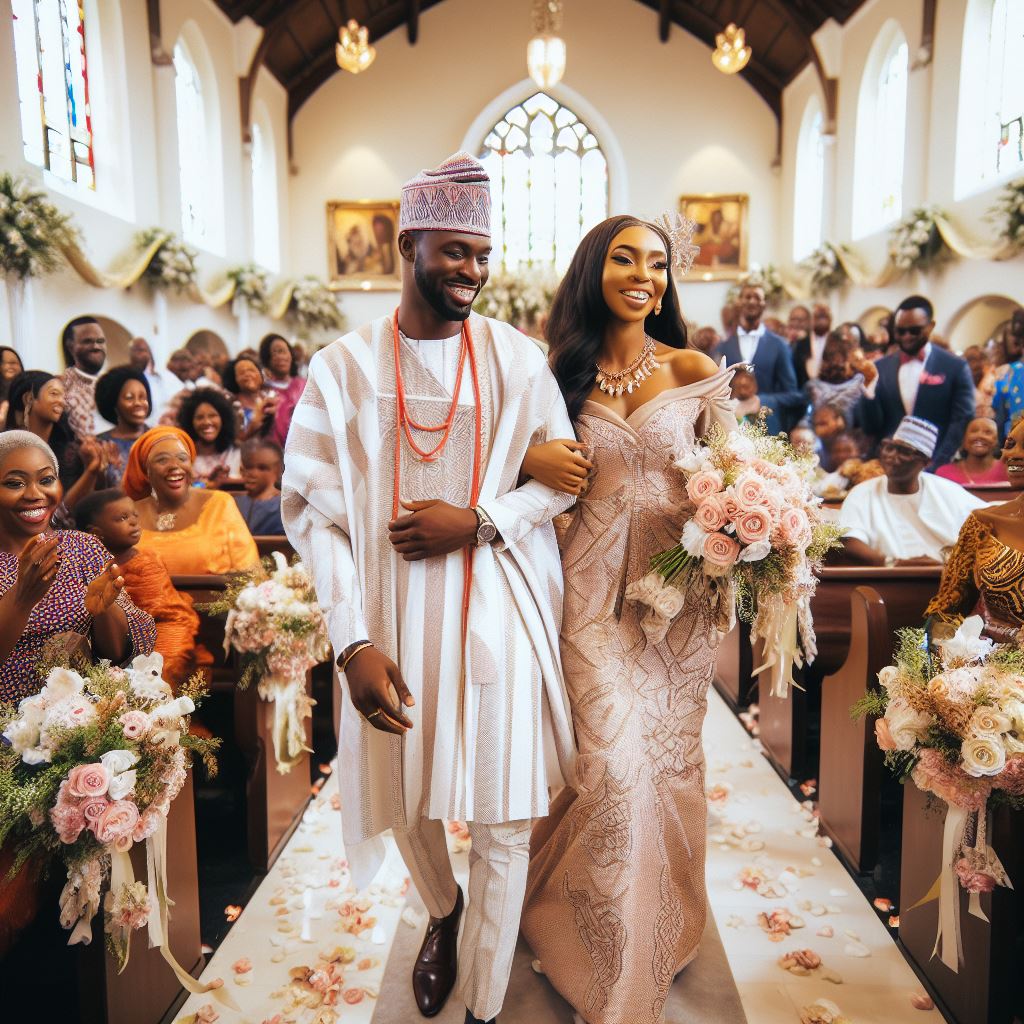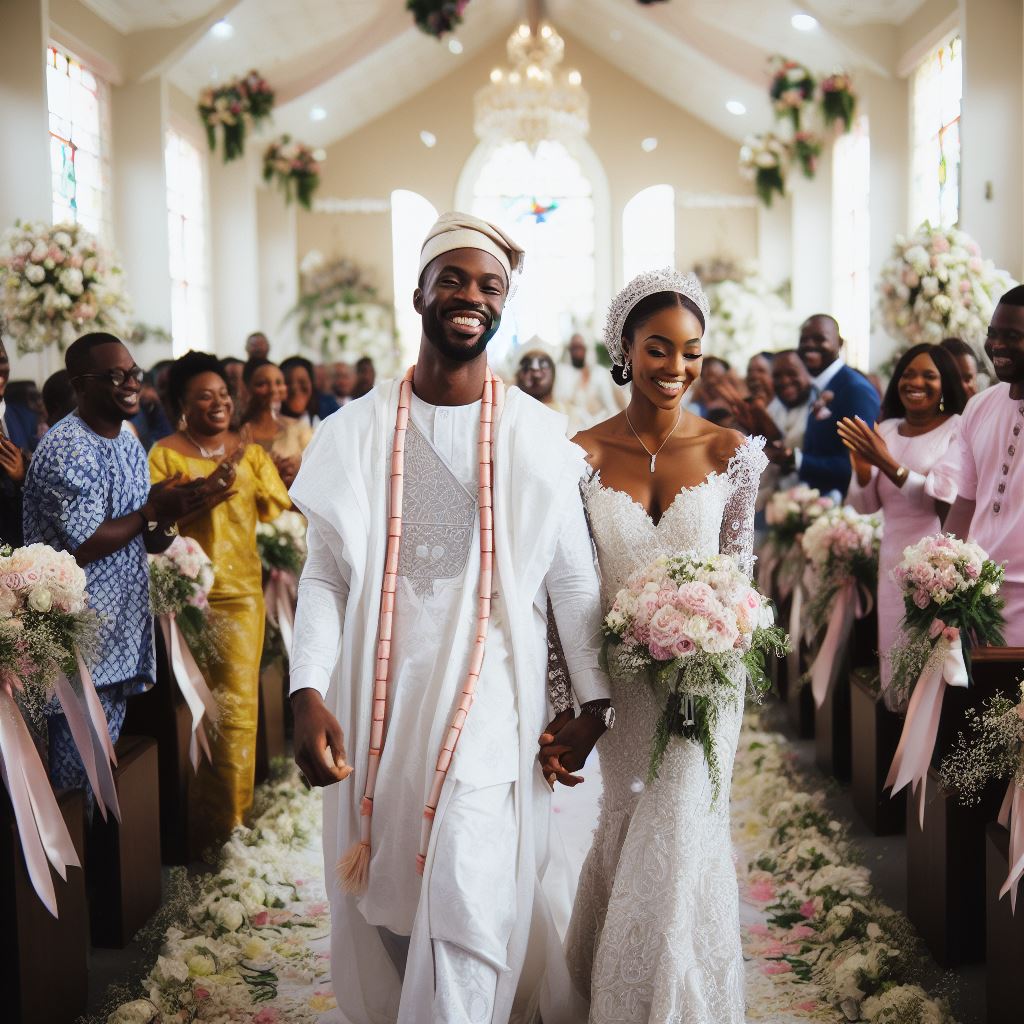Introduction
In Nigeria, religion isn’t just a set of beliefs; it’s the backbone of our culture and society.
Religion permeates every facet of life, and when it comes to marriage counseling, its significance cannot be overstated.
This blog post delves into the interplay of religion and marriage counseling in Nigeria.
We’ll explore how religious beliefs shape marital dynamics, and their influence on counseling outcomes.
Our journey will cover the following:
- The Influence of Religion in Marital Conflicts: How religious doctrines impact conflict resolution.
- Religious Leaders as Marriage Counselors: The roles they play and their impact on couples seeking guidance.
- Challenges and Controversies: The potential pitfalls and debates surrounding religiously-informed counseling.
- Balancing Tradition and Modern Approaches: How can counselors adapt traditional values to contemporary marital issues?
Join us in this exploration of the intricate relationship between religion and marriage counseling in Nigeria.
Understanding Marriage Counseling in Nigeria
Marriage Counseling and Its Importance
Marriage counseling, a therapeutic process, nurtures healthy relationships.
It offers couples a platform to resolve conflicts, enhance communication, and strengthen their emotional bonds.
In Nigeria, where traditional family values are paramount, marriage counseling is indispensable.
Challenges Faced by Married Couples in Nigeria
- Cultural Diversity: Nigeria’s diverse ethnic backgrounds can lead to clashes in marital customs and expectations.
- Economic Struggles: Financial stress often strains relationships as unemployment rates remain high.
- Gender Roles: Traditional gender roles can restrict individual freedom and lead to discontent.
Importance of Seeking Professional Help for Marital Issues
- Neutral Mediation: Trained counselors provide unbiased guidance, helping couples see issues from different perspectives.
- Communication Improvement: Counseling equips partners with communication skills to express feelings and needs constructively.
- Conflict Resolution: Professionals teach conflict management techniques, reducing confrontations and misunderstandings.
The Role of Religion in Marriage Counseling
- Spiritual Guidance: Nigeria’s deeply religious society often seeks solace in religious leaders during marital struggles.
- Moral Framework: Religious principles set the foundation for ethical and moral behavior within marriages.
- Interfaith Dynamics: Interfaith marriages pose unique challenges, requiring counselors versed in various religious customs.
In Nigeria, the role of religion in marriage counseling is significant, with many turning to their faith for guidance and support, making it an essential aspect of the counseling process.
Read: Digital Platforms for Marriage Counseling in Nigeria: A Review
The Significance of Religion in Nigerian Society
Overview of the dominant religions in Nigeria
In Nigeria, the dominant religions are Christianity, Islam, and traditional religions.
These religions play a significant role in shaping the country’s culture and society.
Strong influence of religion on people’s lives and daily activities
Religion has a strong influence on people’s lives and daily activities in Nigeria.
It is not just a set of beliefs but also a fundamental part of Nigerian identity.
Religious practices are integrated into various aspects of life, such as family, education, politics, and even business.
Nigerians often seek guidance and solace through religious beliefs and rituals.
The role of religious leaders and institutions in shaping social norms and values
The role of religious leaders and institutions is vital in Nigeria.
They hold great authority and respect within their communities, often serving as moral guides and advisors.
Religious leaders have the power to shape social norms and values through their teachings and interpretations of religious texts.
They provide guidance on issues such as marriage, morality, and interpersonal relationships.
Christianity is the largest religion in Nigeria, with a significant number of adherents.
Christian churches, both Catholic and Protestant, have a strong presence and influence in Nigerian society.
Islam is the second-largest religion in Nigeria, primarily practiced in the northern regions.
Islamic scholars and clerics have significant influence over their followers, guiding them in matters of faith and personal conduct.
Traditional religions, although practiced by a smaller percentage of the population, still hold cultural and spiritual significance for many Nigerians.
These religions are deeply rooted in African traditions and beliefs.
Moral compass and a source of communal support
In Nigerian society, religion serves as a moral compass and a source of communal support.
It provides a framework for ethical decision-making and helps individuals navigate the complexities of life.
Marriage counseling in Nigeria often incorporates religious principles and values.
Religious leaders are frequently sought out for guidance and mediation in marital conflicts.
Offers couples a shared spiritual foundation
Religion offers couples a shared spiritual foundation and a sense of higher purpose in their marriages.
It provides a framework for resolving conflicts, promoting forgiveness, and fostering mutual respect.
Furthermore, religious institutions organize marriage counseling sessions and seminars to address marital challenges within the context of faith.
These programs aim to strengthen the institution of marriage and promote healthy relationships.
Basically, religion plays a significant role in Nigerian society.
It influences people’s lives, shapes social norms, and provides guidance in various aspects, including marriage counseling.
Understanding the impact of religion is crucial in delivering effective counseling services in Nigeria.
Read: Marriage Counseling Techniques Tailored for Nigerian Couples
Religion-Based Marriage Counseling Approaches
Impact of Religion on Approach to Marriage Counseling in Nigeria
Religion plays a fundamental role in shaping the approach to marriage counseling in Nigeria.
The religious beliefs and values held by individuals greatly influence their perception of marital issues and solutions.
Since Nigeria is a predominantly religious country, with Christianity and Islam being the dominant faiths, religious principles heavily impact marriage counseling practices.
Nigerian society places significant importance on religious teachings and encourages couples facing challenges in their marriages to seek guidance through their faith.
Religion provides a moral compass and offers guidance on leading a righteous and fulfilling life.
As a result, marriage counseling in Nigeria often incorporates religious teachings to address the emotional, psychological, and spiritual aspects of couples’ relationships.
Involvement of Religious Leaders in Providing Counseling Services
Religious leaders, such as pastors, imams, and priests, play a pivotal role in providing counseling services to married couples in Nigeria.
These leaders are seen as spiritual authorities and have a deep understanding of religious principles and their practical applications in daily life.
Many couples prefer seeking counseling from religious leaders due to the trust and faith they have in them.
Religious leaders provide a safe and familiar environment where couples feel comfortable discussing their marital issues.
They offer guidance based on religious doctrines while also incorporating modern counseling techniques.
This integration allows couples to receive spiritual and psychological support simultaneously, fostering holistic healing and growth.
Integration of Religious Teachings and Practices in Counseling Sessions
One unique aspect of marriage counseling in Nigeria is the integration of religious teachings and practices.
Counselors often infuse religious values, virtues, and scriptures to guide couples in resolving their conflicts.
They emphasize the importance of forgiveness, patience, and love as advocated by religious doctrines.
Counseling sessions may involve prayer and meditation, which are believed to provide spiritual nourishment and divine intervention.
Religious practices like fasting or observing specific rituals are also encouraged to enhance couples’ spirituality and strengthen their bond.
The integration of religious teachings helps couples find solace in their faith while seeking resolution for their marital challenges.
Use of Scriptures, Prayers, and Religious Rituals in Marriage Counseling
Scriptures, prayers, and religious rituals are significant components of marriage counseling in Nigeria.
Counselors often reference relevant passages from religious texts that highlight the importance of healthy relationships, mutual respect, and effective communication.
Prayers are offered to seek divine guidance, wisdom, and supernatural intervention in resolving marital conflicts.
Couples are encouraged to pray together to strengthen their spiritual connection and find solace in their shared faith.
Religious rituals, such as marriage blessings or renewal of vows, are conducted to symbolize commitment, renewal, and reconciliation.
Generally, religion plays a vital role in marriage counseling in Nigeria.
The integration of religious teachings and practices allows couples to address their issues holistically, combining spiritual and psychological healing.
Religious leaders act as pillars of support, providing guidance and counseling services based on their understanding of both religious principles and modern therapeutic approaches.
By utilizing scriptures, prayers, and religious rituals, marriage counseling sessions in Nigeria facilitate the growth and restoration of couples’ relationships.
Read: Bridging Cultural Gaps: Counseling for Inter-Tribal Marriages
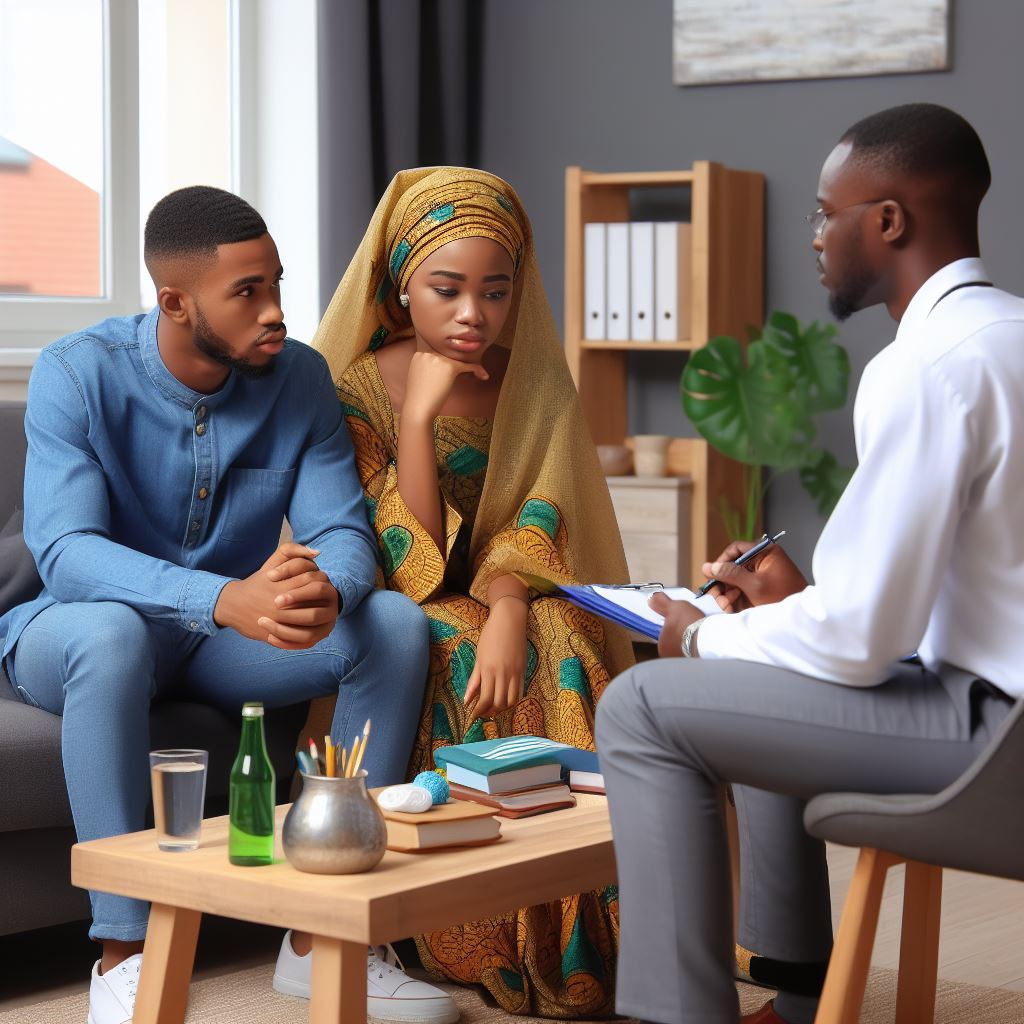
Benefits and Limitations of Religion in Marriage Counseling
Religion plays a significant role in marriage counseling in Nigeria, bringing both benefits and limitations.
Incorporating religion in counseling sessions offers various advantages:
- Provides a spiritual perspective and guidance that intertwines faith with the challenges couples face.
- Helps couples align their behaviors with religious teachings, fostering moral and ethical growth.
- Offers a sense of community and support through religious institutions, providing a network for married individuals.
While religion can greatly enhance the counseling process, it is crucial to acknowledge its limitations:
- Religious counseling may overlook individual and psychological factors impacting the marriage. It may focus primarily on religious principles and neglect personal struggles.
- It might not adequately address complex issues that require specialized therapy, such as trauma, mental health disorders, or substance abuse.
Despite these limitations, the benefits of incorporating religion in marriage counseling sessions often outweigh the drawbacks.
Therefore, it remains an essential aspect for couples seeking guidance and support.
Read: Benefits of Pre-Marital Counseling in Nigerian Weddings
Challenges and Criticisms
When it comes to seeking religion-based marriage counseling in Nigeria, couples may face various challenges.
These challenges can impact the effectiveness of the counseling and hinder the couples’ ability to resolve their marital issues.
Additionally, there are criticisms regarding the exclusive reliance on religious counseling without considering other approaches.
1. Lack of confidentiality
One challenge faced by couples seeking religion-based marriage counseling in Nigeria is the lack of confidentiality.
In some cases, the counselor may not adhere to strict confidentiality guidelines, leading to the couples feeling uncomfortable sharing their personal and sensitive information.
This lack of trust can undermine the effectiveness of the counseling process.
2. Gender bias and inequality in counseling practices
Another challenge is the presence of gender bias and inequality in counseling practices.
In Nigeria, certain religious beliefs and cultural norms may perpetuate gender roles and stereotypes, which can manifest in counseling sessions.
This bias may affect the dynamics within the counseling process and hinder the couples’ progress in addressing their marital issues.
3. Indifference towards secular or interfaith marriages
Religion-based marriage counseling in Nigeria may also overlook the challenges faced by couples in secular or interfaith marriages.
If the counselor’s focus is solely on religious beliefs and practices, couples who come from different faith backgrounds or choose not to follow any religion may feel excluded or misunderstood.
This indifference can restrict the effectiveness of the counseling in addressing their specific needs.
Aside from these challenges, there are criticisms surrounding the exclusive reliance on religious counseling without considering other approaches:
1. Limited scope of advice
Relying solely on religious counseling may limit the scope of advice provided to couples.
While religious teachings can provide valuable guidance and principles, they may not encompass all aspects of marital issues, such as psychological or communication dynamics.
Neglecting these areas may hinder the effectiveness of the counseling process.
2. Lack of evidence-based techniques
Critics argue that religious counseling often lacks evidence-based techniques used in other therapeutic approaches.
Without utilizing scientifically proven methods, the effectiveness of the counseling may be compromised.
This criticism highlights the need for an integrative approach that combines religious teachings with evidence-based practices.
3. Neglecting individual differences and needs
Religious counseling may focus more on adhering to religious principles than considering individual differences and needs.
Every couple has unique challenges, and the counseling approach should be tailored to their specific circumstances.
Neglecting individual differences may diminish the relevance and effectiveness of the counseling in addressing the couples’ marital issues.
Essentially, seeking religion-based marriage counseling in Nigeria can present various challenges for couples, including the lack of confidentiality, gender bias, and indifference towards secular or interfaith marriages.
Additionally, criticisms arise from relying solely on religious counseling without considering other approaches.
Addressing these challenges and criticisms is crucial to enhance the effectiveness of marriage counseling and ensure that couples receive comprehensive support in resolving their marital issues.
The Evolving Landscape
In Nigeria, the dynamics of marriage counseling have undergone significant changes in recent years.
Previously, religious counseling held a predominant role in assisting troubled couples.
Growing acceptance of secular counseling methods alongside religious counseling
However, there has been a growing acceptance of secular counseling methods alongside religious counseling.
This shift is due to several factors, including the recognition of the importance of psychological approaches in addressing marital issues.
One of the primary reasons for the acceptance of secular counseling methods is their effectiveness in dealing with specific psychological aspects of marital problems.
While religious counseling focuses on spiritual guidance, secular counseling delves into behavioral and emotional aspects.
The importance of a holistic approach that combines religious and psychological perspectives
Marriage counselors now realize the immense value in adopting a holistic approach that incorporates both religious and psychological perspectives.
By combining these two approaches, counselors are better equipped to address the multi-faceted challenges faced by couples.
A holistic approach recognizes the impact of religion and spirituality on individuals and their marriages.
It acknowledges that for many Nigerians, religion plays a significant role in their lives and often informs their values, beliefs, and decision-making processes.
Moreover, religion can provide a sense of comfort and hope, especially during difficult times in a marriage.
Therefore, religious counseling should not be disregarded, but rather be integrated into secular counseling methodologies.
Secular counseling techniques, on the other hand, offer evidence-based interventions and strategies that have been proven effective in resolving marital conflicts.
These methods focus more on communication, conflict resolution, and individual well-being.
Provides a comprehensive framework that addresses the spiritual, emotional, and behavioral aspects of marriage
The combination of religious and psychological approaches provides a comprehensive framework that addresses the spiritual, emotional, and behavioral aspects of marriage.
This integrated approach recognizes that different individuals may respond better to certain counseling techniques.
Additionally, the evolving landscape of marriage counseling in Nigeria has seen an increase in trained professionals who can provide both religious and secular counseling.
These counselors undergo specialized training to become proficient in both approaches.
Ability to meet the diverse needs of Nigerian couples
The importance of this evolving landscape lies in its ability to meet the diverse needs of Nigerian couples.
By offering a range of counseling methods, counselors can tailor their approach to best suit the specific needs and beliefs of each couple.
Ultimately, the goal of marriage counseling is to help couples navigate their challenges and build healthier, happier relationships.
The evolving landscape of counseling in Nigeria recognizes that a one-size-fits-all approach is not sufficient.
More comprehensive and effective support system for couples
Thus, by integrating both religious and psychological perspectives, counselors can provide a more comprehensive and effective support system for couples.
This holistic approach acknowledges the significance of religion while utilizing evidence-based techniques to facilitate positive change.
In general, the changing dynamics of marriage counseling in Nigeria have led to the growing acceptance of secular counseling methods alongside religious counseling.
The importance of a holistic approach that combines religious and psychological perspectives cannot be overstated.
By doing so, counselors can better address the diverse needs of Nigerian couples and enhance the effectiveness of their counseling services.
Conclusion
This blog post discussed the role of religion in marriage counseling in Nigeria.
We highlighted how religion plays a significant role in shaping the counseling process and outcomes.
By integrating religious values, beliefs, and practices, counselors are better able to connect with clients and provide a culturally appropriate approach to helps couples navigate their marital challenges.
Religion serves as a guiding force, offering spiritual support and solutions to couples in need.
It fosters a sense of hope, bringing comfort to those experiencing difficult times in their marriages.
Furthermore, religion provides a framework for moral values and ethical standards, creating a solid foundation for couples to build their relationships upon.
However, it is important to approach marriage counseling with an open mind and a balanced perspective.
While religion can provide much-needed guidance, it is essential to consider the individual needs and preferences of each couple.
Adopting a flexible approach that respects and incorporates diverse belief systems can lead to more effective and inclusive counseling outcomes.
In light of this discussion, we encourage our readers to reflect on their own experiences with marriage counseling.
What role did religion play in your counseling journey?
Did it bring you closer together or create challenges?
We invite you to share your thoughts and experiences in the comments section below.
Let us continue the conversation and learn from one another’s perspectives.

